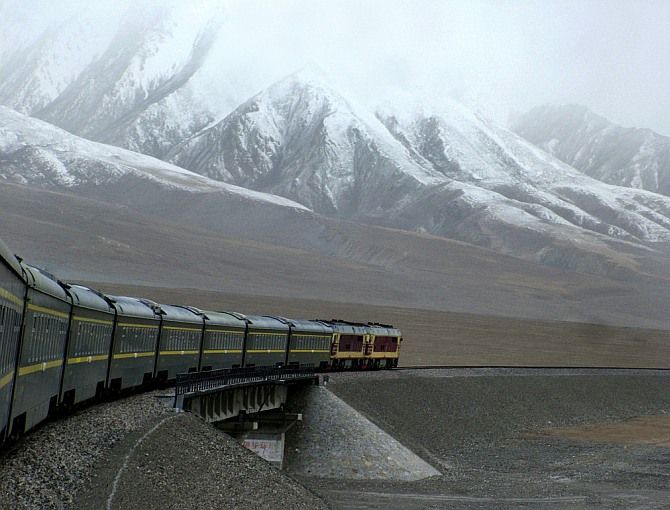
India should put a check on its cheque book diplomacy with Nepal.
Nepal must be made to bear the costs of its strategic provocations, argues Rajeev Sharma.
India needs to be worried -- very worried -- over the landmark agreement signed on Monday, March 21, between Nepal and China wherein Beijing will extend its highly strategic Tibet rail link to Nepal which once completed will end India's monopoly as being Nepal's only connectivity point to reach out to the world by way of trade and people-to-people contacts.
Through the proposed rail link, China would do even better in reaching out to a contiguous neighbour of India like Nepal than what China did to India's another contiguous neighbour like Pakistan when it constructed an all-weather Karakoram Highway connecting China and Pakistan in the 1970s.
The Karakoram Highway was completed in 1979 and opened to the public in 1986. Had the highway been completed before the India-Pakistan War in 1971 one can imagine the impact it would have had on the outcome.
The Nepal-China rail link pact has the potential of hitting India hard strategically. There is precious little that India can do in this regard. Nepal and China are sovereign nations and India can hardly object to what they decide to do between themselves.
But it makes clear a lot of things to India vis-a-vis Nepal.
One, it confirms Indian apprehensions about the conduct of Nepal, a country that has for long been been playing the China card with India and the India card with China.
Two, it shows that Nepal is an untrustworthy neighbour.
Three, it yet again forewarns India about mollycoddling Nepal.
The development will inevitably force India to deal with Nepal in a more pragmatic manner. The most immediate impact the development should have on India-Nepal relations is that India should put a check on its cheque book diplomacy with Nepal.
From here on, India should tell Nepal that its aid, investments and economic cooperation would be subject to concrete deliverables from Nepal, politically and strategically.
Nepal must be made to bear the costs of the strategic provocations it has been handing out to the Indians, routinely and nonchalantly.
Nepal will soon realise that its China card vis-a-vis India is a damp squib and geography favours India.
The Nepalese realised it recently when the K P Oli government bragged about getting alternate fuel supplies from China and Bangladesh when the Madhesis launched their crippling blockade for over three months.
Zilch came from Bangladesh and insignificant fuel supplies came from China.
One has to understand and appreciate that China has only agreed to 'consider' building the proposed rail link with Nepal. Going by China's track record, its infrastructure projects are completed at breakneck speed. But that happens only when China sights strategic windfalls and economic returns.
One will need to watch if the China-Nepal link happens quickly because China gains little in strategic and economic terms. Trade with Nepal is not high on the Chinese agenda. China builds trans-national infrastructure projects only when it is assured of reaching out to many more countries and regions.
At a time when the Chinese economy is under severe stress, it is unlikely that China will open its purse strings for Nepal at the expense of a big power like India, and that too when it doesn't promise commensurate economic returns.
The news of China agreeing to build a strategic rail link to Nepal through Tibet has come at a time when India is looking to build at least five new rail links with Nepal.
While one line linking Raxaul in India to Birgunj in Nepal has been operational since 2005, two more lines under construction are expected to be completed in the next two years.
Clearly, the Nepal-China rail pact has poured cold water on pro-Nepal lobbyists within the Indian government. It also puts a big question mark on the Narendra Modi government's outreach to Nepal and its over eagerness to loosen its purse strings for Nepal.
Rajeev Sharma is an independent journalist and strategic analyst who tweets @Kishkindha.










